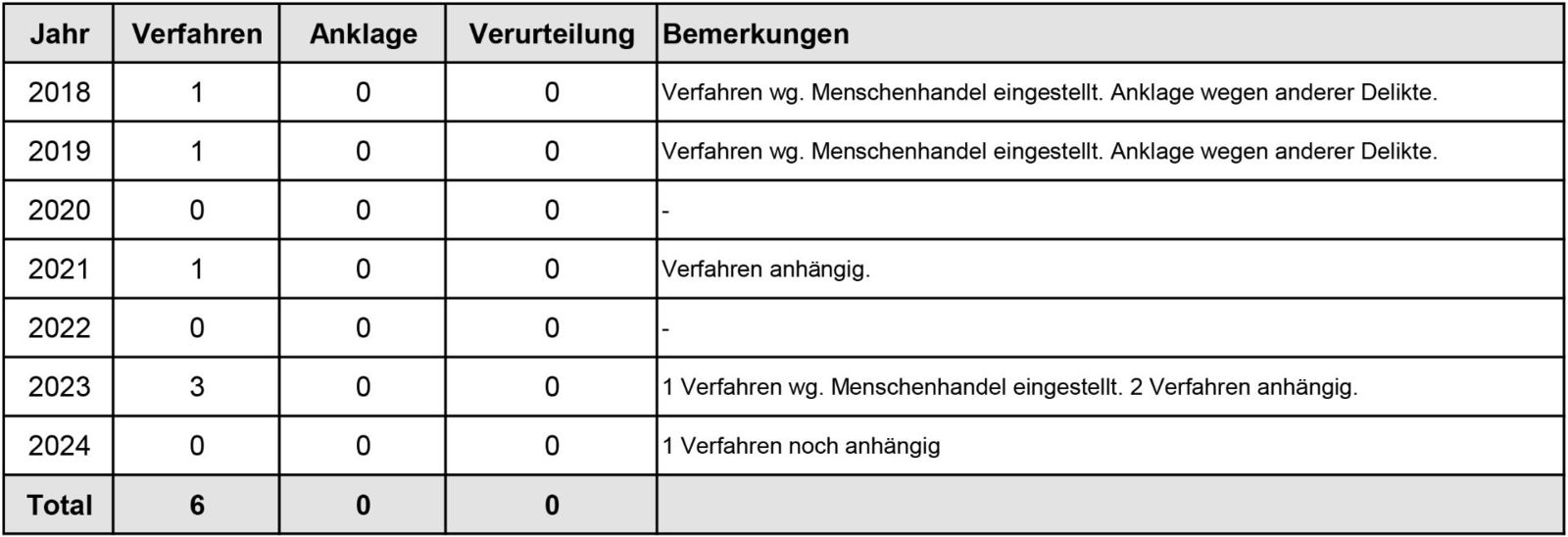Human trafficking
Human trafficking involves serious human rights violations. It leads to serious physical, psychological and social damage and deprives the victims of their dignity and self-determination. Trafficked persons are deprived of their freedom and papers, exploited and forced into work or prostitution. From March 5 to 7, the Council of Europe's Group of Experts on the Review of the Council of Europe Convention on Action against Trafficking in Human Beings (GRETA) visited Liechtenstein. It exchanged views with government and administrative authorities as well as civil society organizations. The focus of this evaluation round is on the access of victims of human trafficking to justice and effective legal remedies. The report and recommendations are expected in 2025.
Action plan against human trafficking
In its 2024 report, the UN Committee against Torture (CAT) expresses concern about the lack of a national plan to combat human trafficking and recommends proactively investigating the risk of human trafficking and carrying out prevention work, even if there are no specific complaints. To this end, particularly vulnerable population groups should be made aware of the risks of human trafficking and encouraged to report it. Judges, law enforcement officers and migration and border control officials should be trained in the early identification of victims of human trafficking and their referral to appropriate social and legal services. When cases of human trafficking are uncovered, not only should perpetrators be punished, but victims should also receive appropriate protection and support, including through - at least temporarily - secure residence and protection from prosecution in Liechtenstein.
Develop an action plan against human trafficking that focuses on protecting victims and raising awareness among vulnerable groups. Train judges, migration authorities and the police on human trafficking.
Reporting office
In September 2023, a report office for human trafficking was set up at the state police. To this end, the state police's whistleblower platform, which has been in place since 2020, was expanded to include reports of suspected human trafficking. Whistleblowers can now communicate with the state police about their suspicions via an online portal while remaining anonymous. The VMR welcomes the establishment of the reporting office, but is critical of its location within the state police. A law enforcement agency is a very high-threshold reporting office compared to a non-governmental advice center for victims and witnesses. It is still difficult to establish contact with victims. There is also a lack of low-threshold access to support services and information. Nevertheless, in its report published in 2024, the UN Committee against Torture (CAT) welcomed the introduction of the reporting office at the national police force as significant progress.
Since the hotline was set up, one report of suspected human trafficking has been recorded via the whistleblower system. No reports of human trafficking were recorded in 2024.
Round table on human trafficking
The inter-agency "Round Table on Human Trafficking" has existed in Liechtenstein since 2006 under the leadership of the National Police and with the participation of the Public Prosecutor's Office, the Victim Support Office, the Office of Economic Affairs, the Office of Foreign Affairs and the Foreigners and Passport Office. The Round Table aims to strengthen cooperation between law enforcement authorities, migration authorities and institutions for the support of victims of human trafficking. If necessary, it can involve other stakeholders, including non-governmental organizations. Since 2018, the Round Table has documented six cases of human trafficking in Liechtenstein. None were added in the reporting year. No charges have been brought in any of the proceedings to date. Fulfilling the offense is very difficult. On the one hand, providing evidence is extremely challenging. On the other hand, the victim must testify, which proves difficult in almost all cases. However, there have been convictions in such cases for other offenses, e.g. welfare fraud. One case is still pending and three cases from 2023 have since been discontinued.
Make the national reporting office for human trafficking at the state police better known and firmly institutionalize the exchange between the Round Table on Human Trafficking and non-governmental specialist agencies.
International commitment to human trafficking
At the international level, the fight against human trafficking and modern forms of slavery is a focus of Liechtenstein's commitment to human rights. With the multi-stakeholder initiative against the financing of human trafficking and modern forms of slavery (FAST, Finance Against Slavery and Trafficking), Liechtenstein is committed to mobilizing the financial sector against modern slavery. The aim of the initiative is to involve the global financial center in the fight against slavery and human trafficking, which are enormously lucrative illegal business models, and to hold it accountable. In addition, various international meetings on combating human trafficking took place in 2024, in which Liechtenstein participated. In addition, Liechtenstein once again supported the "Human Trafficking" research focus of the Ludwig Bolzmann Institute for Fundamental and Human Rights with CHF 70,000 and the "UN Fund for Victims of Human Trafficking" with CHF 100,000 in the reporting year.

